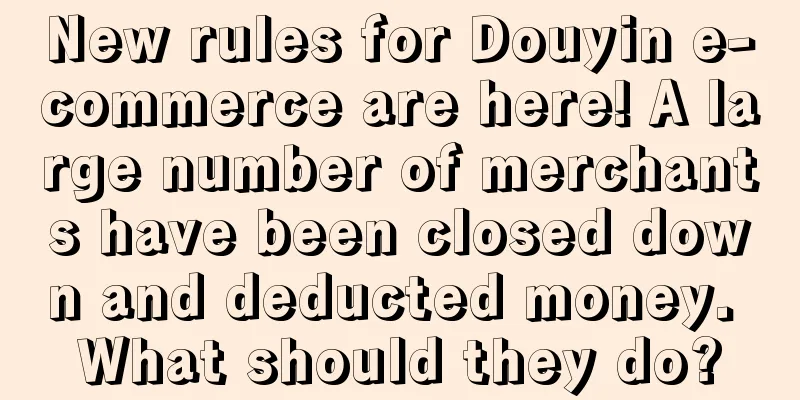Taobao's balancing strategy is to encourage people to "compete with their internal strength"

In the past five years, the explosion of short video e-commerce with the help of traffic has made ordinary consumers know for the first time what the "lowest price on the entire network" means - goods that usually cost three or four hundred yuan can actually be sold at a price of less than one hundred yuan with the hard work of the anchors. Moreover, the refund-only policy, which was imitated by all major platforms, has won the hearts of a large number of consumers. This has led to an unprecedented intensity in the price war between e-commerce platforms. This is the so-called traffic first, price is king. Recently, Taobao announced that it will optimize the "refund only" strategy, enhance the after-sales autonomy of merchants based on the new experience score, and reduce or cancel after-sales intervention for high-quality stores. The relevant strategy will be officially implemented on August 9. As soon as the news came out, it quickly sparked heated discussions. One of the major backgrounds is that this year, the tried and tested traffic routines in the e-commerce industry began to fail. On the one hand, the long-term excessive operation of only refunds has spawned a large number of wool parties who make a living from this, and thus bred a gray industrial chain. Some merchants who offer free shipping for 9.9 yuan have snatched away price-sensitive customers with lower product quality and lower prices. However, under this logic, the quality of goods has no other obvious advantages except price. This ultimately leads to the deterioration of the entire category, and consumers are still the ones who pay the bill. This is a typical case of bad money driving out good money. After many twists and turns, the e-commerce industry has returned to the traditional logic of selling goods by relying on "internal strength". Whether it is the reduction of business costs for merchants or the strengthening of consumer rights, objectively speaking, the experience of both buyers and sellers has been improved, and sellers can "make money while standing" by obtaining goods of reasonable quality at reasonable prices. This is the normal "business philosophy" of the e-commerce industry. This time, Taobao took the lead in becoming the catfish of the e-commerce industry and put the e-commerce industry back on track. 1. The cost of “low price & refund only”Of course, in terms of the relationship between the two, consumers and merchants, the former is undoubtedly the weaker party. Statistics show that among the top ten types of online consumer complaints, refund issues account for nearly one-third. In this context, "refund only" is necessary, which can not only protect the legitimate rights and interests of consumers, but also effectively punish counterfeit and shoddy merchants and runaway merchants. Ms. Chen, a figure enthusiast, bought two anime figures online. Both figures were pre-sale products and were scheduled to be shipped in late February 2024. At the end of January 2024, Ms. Chen asked the store customer service for the delivery time for several consecutive days, but the seller did not respond. It was not until more and more buyers like her left messages on the store product page saying "I can't get in touch with you," "The store is gone," and "I can't get a refund" that she realized the merchant had run away. The time when Ms. Chen's incident happened was no longer the 13-15 years when the e-commerce industry was growing wildly. In such a situation, "refund only" is undoubtedly a very effective after-sales method. There is no doubt that when the platform growth encounters a bottleneck, the fastest growing platform and its most unique policies will often be imitated. There will always be loopholes in policies. After the "refund only" policy, the goods are still in hand and you will make a profit whether you sell more or less. You can even earn some money from freight insurance. This is the case in the past two years, after the "refund only" policy became popular on e-commerce platforms, and the "free-to-refund" model has enabled the "wool party" to make small profits but quick turnover. The model of earning freight insurance is also very simple. You can place an order for multiple products at the same store at the same time but have them shipped separately. However, you can get a refund without any reason after receiving the goods. The merchant needs to pay 11 yuan for a freight insurance. In other words, you only need to operate a few more times on your phone to get a day's meal money. If it is a large-scale "militarized freeloading", then the return cost borne by the merchant can be imagined. Anyone can see that whether it is the "refund only" of refunding without returning the goods, or the multiple compensation of a single freight insurance, the balance between merchants and consumers has been unreasonably tilted. Unscrupulous merchants should certainly be punished, but the law enforcers should not be online black industries and wool parties, and the method should not be the malicious "refund only" and the suspected insurance fraud "freight insurance". This has caused a large number of honest businesses to suffer unexpected disasters due to policy loopholes, and has also indirectly harmed normal consumers. Under this premise, merchants have two choices. One is to leave the platform with strict after-sales service and operate on the platform with normal after-sales policy, which is undoubtedly a clearance of high-quality sources. Another type of sellers who offer extremely low prices as “9.9 free shipping” do not actually have the above-mentioned problems, because their rigid expenses such as material costs are already extremely low, and a small amount of after-sales service does not affect their profit level. However, if the current platform rules only allow such merchants to survive, it will also result in consumers who have high requirements for product quality being unable to purchase truly high-quality products. Ultimately, users will leave the platform, causing a decline in GMV. The "bad money driving out good money" of low-priced goods and the bottom-line "refund only" worsening the business environment are the core reasons why Taobao decided to change its own platform as it did 20 years ago, and then influence the entire industry and let e-commerce return to the right track of competing in internal strength. 2. Only those who dare to fire the first shot can be good merchantsWhen the platform's traffic dividend disappears completely and all companies are on the same starting line, e-commerce will return to the normal track of "competing on internal strength": whether it is product quality and richness, business environment, logistics experience, customer service capabilities, product experience, promotion efficiency, etc., all constitute a scoring sheet in the minds of buyers and sellers. Whoever has a higher comprehensive score will win. The era of having one trick is over. Whoever can "fire the first shot" at this time will be more likely to hold the ticket to the next e-commerce generation. From the reform of "refund only", we can find that among the platforms that are generous to "merchants", Taobao has become the first to stand out. In the recent intensive adjustment of merchant operating rules, the refund only policy has been greatly optimized: stores with a store experience score of 4.8 or more have the right to independently handle returns and refunds, and merchants in other segments also have certain disposal rights. In addition, there is another change that has been ignored by the media. Taobao Tmall said that it would gradually improve the refund-only model, use machines to block suspicious "wool parties", and filter high-value refund-only cases for manual review. It is impossible for manual customer service to handle a large number of after-sales services every day, and the importance of the refund-only model is self-evident. These adjustments are not only for high-scoring merchants, but also for all merchants to bring fairness. It can also be seen that Taobao is ready for the implementation of the new experience system. More importantly, for merchants who abide by the rules and users who consume normally, their actual experience will not be qualitatively different from before. The improvement of "refund only" is not aimed at this group of users, but at the wool party and gray and black industries that take advantage of the rules to "bug". Judging from the growth of the overall e-commerce market, the blind indulgence of some platforms in "refund only" has caused the quarterly GMV growth rate to fall by 30%, which had previously been above 40%. In addition, Taobao has also made the perception of low prices stronger and stronger through the increase in 88VIP and 10 billion subsidies. From the third quarter of last year to the first quarter of this year, about 1.1 million merchants flowed to Taobao. This is also a return to the business environment where "experience is king", allowing high-quality merchants and real consumer experience to return to an organic combination of ecology. Currently, many merchants participating in the internal test have stated that after the optimization, unreasonable "refunds only" have dropped sharply, many abnormal behaviors have been directly intercepted by the system, and normal "refund only" demands can generally be negotiated independently; for higher-value orders that merchants are more worried about, not only will the system not automatically approve them, they will even go directly to manual review. Trying to please "price-sensitive" consumers without any bottom line will not make it easier to do business. If transactions between buyers and sellers are to become normalized, a necessary condition is that the participants can have a good experience in these interactions, including but not limited to consumers' evaluation of products and merchants, merchants' own credit mechanisms, consumers' own behavioral models, etc. Only when the platform is fair and rational can it continuously "innovate" and the platform atmosphere will become better. 3. How does Taobao “switch” the e-commerce industry?Since Taobao was founded in 2003, domestic e-commerce has always been competing in terms of "internal strength" of business operations, but since 2020, two major divergences have occurred: First, the two new traffic forms of short videos and live broadcasts have exploded, creating a number of successful examples that have hit the cusp of the trend, and many businesses have not been fully prepared for the decline of the traffic dividend. Second, low prices have become the main theme of e-commerce. Platforms, merchants, and users are all calling for low prices. In the end, the industry's pursuit of low prices has gone to extremes. Platforms almost use low prices as the only baton, which ultimately hurts not only merchants but also consumers. The one-size-fits-all refund and mandatory freight insurance have prompted merchants to cut corners on rigid manufacturing costs, resulting in a significant decline in product quality. Consumers get low prices while also bearing low quality, forming a lose-lose situation for both buyers and sellers. In essence, if the e-commerce industry wants to get rid of the aforementioned "morbid" operating environment and return to the essential logic of selling goods, it requires joint efforts from platforms and consumers. In other words, it is the leveling of the "experience" - the comprehensive platform experience consisting of the normal operation of merchants and the rights, benefits and experience of consumers. From the platform's perspective, a series of operational tools are needed to reduce merchants' operating costs and to ensure the legitimate rights and interests of merchants in all aspects of sales. Only after the merchants' "back end is stable" can the quality of goods be improved and prices become more reasonable. Starting this year, consumers can also find that the Taobao shopping experience is becoming more and more pure. On the one hand, this year's 618 has become extremely simple, and the biggest change is the cancellation of the official pre-sale link. Once upon a time, this was a marketing strategy designed by e-commerce platforms to help merchants prepare goods in advance and reduce logistics pressure. However, as time went on, this mechanism gradually exposed its shortcomings in user experience - from seeing the discount notice to the final payment and delivery, it took up to 10 days to wait. This long waiting process had too many variables, and the return rate was naturally high. After the pre-sale was cancelled, the previous practice of users "doing a certain amount of questions and getting discounts" naturally became history. From the merchant side, as early as January this year at the 2024 Merchant Service Conference, Taobao and Tmall made it clear that they would upgrade the new store comprehensive experience scoring standards. Under the new scoring system, "store experience score" and "product experience score" will be fully applied to most Taobao store operation scenarios. Product reputation will be fully linked to merchant operations. The higher the experience score, the more traffic the merchant's store and products will receive. In the low-price battleground, Taobao is well aware that no one has an absolutely solid moat. The battle for low-price mindset will become a long-term war, and it is no longer realistic for other platforms to reap the benefits of low prices as they did in the past two years. When the dividends disappear, all companies will be on the same starting line, and the good merchant ecosystem that Taobao has cultivated over the years will feed back, and e-commerce will return to the normal track of "competing on internal strength": product quality and richness, business environment, logistics experience, customer service capabilities, product experience, promotion efficiency, etc., constitute a scoring sheet, and whoever has a higher comprehensive score will win. This may also be a kind of reincarnation. More than ten years ago, Taobao opened the era of big e-commerce. More than ten years later, Taobao also chose to start a new round of experience reform. The lose-lose situation of buyers and sellers and the continuous deterioration of the business environment are expected to be truly improved by Taobao, a catfish. When the e-commerce industry is about to enter a new historical track, Taobao is not only a "switchman", but also a pioneer. Author: Ling Zhuhou |
<<: In the Paris Olympics marketing, did Yili succeed in “ambushing” Mengniu?
Recommend
What is the impact of Amazon's lower buy box win rate? What are the factors?
Merchants who open stores on Amazon are actually v...
How to optimize the live broadcast room's speech and improve the conversion and retention of the live broadcast room? Let's take a look at the live broadcast speech methods and strategies of the top accounts of Italian noodles.
Good live broadcast scripts are crucial to the ret...
Building a data indicator system, I summarized the entire standardization process
In the world of data analysis, building an effecti...
Where can I open Shopee's overseas warehouse? What is the process for entering the warehouse?
After we open a store on Shopee, there are many th...
Can Amazon merchants get loans? What are the requirements for Amazon loans?
On Amazon, a huge e-commerce platform, sellers nee...
How can Amazon images be copyrighted? How to prove the copyright of images?
E-commerce platforms still attach great importance...
High temperatures "heat up" young people's consumption
This article mainly discusses the phenomenon that ...
What is the gmarket China purchase process? Process Introduction
Gmarket is a Korean e-commerce website. We can als...
Following the video account, the public account is being promoted
From the internal beta push mechanism to the launc...
Big news! WeChat official accounts can finally change titles, and also launched the "content boost" function
Yesterday, WeChat official accounts made two impor...
What are the infringements committed by Amazon? Three major infringements
Infringement is common on e-commerce platforms. If...
What is the Shopee Singapore 55 Big Promotion? Detailed introduction
There are 7 days left to register for the 4.25 cou...
Who will bear the shipping fee for Shopee's free shipping campaign? How to ship after placing an order on Shopee?
As a leading e-commerce platform in Southeast Asia...
Some fragmented thoughts on the Internet and the marketing industry
Working in the Internet and marketing industry req...
It’s 2023 now. Are there still brands that don’t know how to use memes?
Starting from the current social hot topic - the p...









